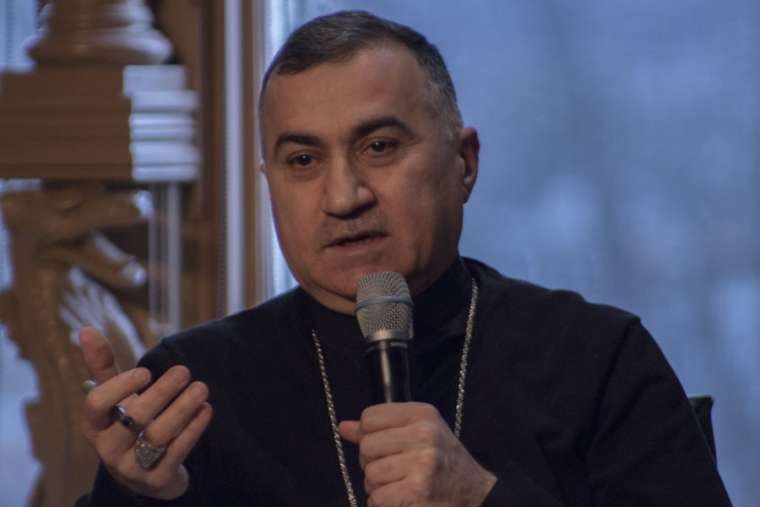The Archbishop of Erbil in Iraqi Kurdistan has called for Muslim nations to help rebuild the Christian and Yazidi villages destroyed by Islamic State (IS).
Archbishop Bashar Warda said: “It is not enough to say ‘ISIS does not represent Islam’. We need more.”

Helping to rebuild what IS destroyed would be a “sign of solidarity,” he said during a 15 February speech in Washington’s Georgetown University hosted by the university’s Berkley Center for Religion, Peace and World Affairs.
As an example of this, he praised the United Arab Emirates: “Since the ISIS attack, they’ve been with us, helping all – Catholics, Yazidis, Muslims.”
Warda expressed alarm that although IS has been defeated militarily in Iraq, deeply intolerant views remained far beyond the territory the group had seized. “Post-ISIS, when ISIS has shaken the conscience of the world, and shaken the conscience of the Muslim majority world as well,” he said, much of Islam “defines you as infidels”.
The Chaldean Catholic archbishop, whose diocese has been taking care of thousands of families who fled IS in 2014, said reform is required within Islam: “We object that one faith has now the right to kill another. There needs to be a change and a correction within Islam.”
The archbishop said that following IS’s expulsion of non-Muslims from the territories it seized, “there is nothing left but to speak plainly… When there is nothing left to lose, it is very liberating”.
“There is a fundamental crisis within Islam itself and if this crisis is not acknowledged, addressed and fixed, then there can be no future for Christians in the Middle East,” he said, and praised pro-reform Muslim leaders who have made similar calls.
“In the Middle East, we have moved from fear to terror to horror,” he said. “Where next? … Hundreds of thousands of innocent people have died.”
He said Christians’ persecution at the hands of Muslims began long before the arrival of Islamic State: “We experienced this not for the last four years, but 1,400 years.”
However, he argued that Christians were partly to blame. “We did not push back against the recurring periods of terrorism that inflicted cruel pain upon our ancestors,” he said. He added that Christianity needs to return to a “pre-Constantine vision” of the Church, recalling Jesus’ words to Pontius Pilate before his crucifixion: “My kingdom is not of this world.”
“We say this to our Muslim neighbours, learn this from us. Let us help you heal. Your wounds are as deep as ours … We pray for your healing. Let us heal our wounded and tortured countries together,” he said.
Meanwhile the Baghdad-based Chaldean Patriarch, Louis Sako, voiced concern that a recent funding conference for Iraq had not included discussion of the country’s minority populations.
Iraqi officials at the 13-14 February Kuwait International Conference for Reconstruction of Iraq said at least US$88bn would be required to rebuild the country’s shattered infrastructure, its hospitals, schools, homes and telecommunications.
A mixture of grants, loans and investments were pledged by Saudi Arabia, Kuwait, Qatar, Turkey, the UAE and the US.
“None of the participants spoke about minorities – Christians and Yazidis – and this is very serious,” Patriarch Sako told the Rome-based website AsiaNews.
“Rebuilding the villages and towns in the Nineveh Plain and restarting economic activities are essential to guarantee the future of the region and ensure the survival of that unique mosaic that is Iraq.”
He added that Iraq needs not only money but also “a ‘Magna Carta’ for democracy, citizenship and security.”
“The danger,” he added, “is that money may end up, as in the past, in the pockets of corrupt people or fund jihadist groups still present in the territory.”
